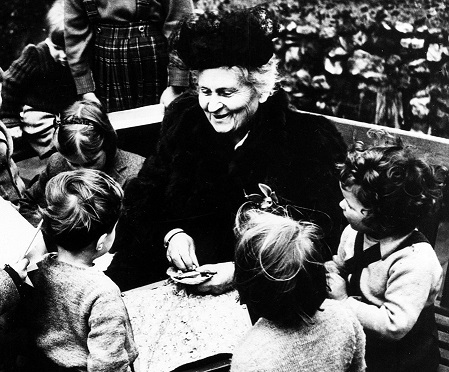The Montessori Method is an educational approach that promotes rigorous, self-motivated growth for children in all aspects of their development (cognitive, physical, social, and emotional). An educational environment is designed to stimulate the child’s interest and facilitate his or her understanding and learning capacities spontaneously.
The Montessori Method was created by Dr. Maria Montessori. Dr. Montessori was born in Italy in 1870 and was a physician, educator, and innovator. She was raised in a family that valued education and this same passion for knowledge took hold in her from a young age. As Maria Montessori grew, she became involved in many fields of study before creating and developing the Montessori method of education that focuses on the way that children learn naturally.
Using her scientific background, Dr. Montessori began observing children in the Casa dei Bambini or Children’s House, which became the first Montessori School. Based on her unbiased observations she created unique materials and a child-centered environment. Dr. Montessori was one of the first people to revolutionize educational thought by stressing respect for the child, freedom of expression, self-education, and training through use of movement and senses.


The main purpose of Montessori education is to help each child develop essential skills already ingrained within themselves to master the creative learning process throughout their lives. The Montessori Method is designed to help children develop the skills essential for success, not only in school and education, but also in life.
The Montessori Classroom is known as the “prepared environment”. Through careful selection of materials, an environment is assembled, which allows the child to explore life and learn in a level they can understand. The materials are designed to stimulate independent exploration. This prepared environment allows the child to proceed at his or her pace from simple activities to more complex ones. Through this process the child’s natural curiosity is satisfied and they begins to experience the joy of discovering the world. Materials and curriculum include Practical Life activities, Sensorial development, Language, Math, Geography, Science, Art and Music.
The Montessori teacher facilitates the classroom activity. The teacher carefully plans the environment in the interests of the children, and helps the children progress from one activity to the next. Montessori educators are trained to deal with each child individually, allowing children to choose from many activities within their range of ability.
In a Montessori classroom, rather than seeing a teacher at the front of the classroom giving the same lesson to every child, the teacher will be working quietly with individual children or small groups. While that is happening the rest of the children are free to spend their time doing the work that calls to them. A Montessori teacher works hard to create structures that allow children to be independent and to trust themselves as learners.
Montessori teachers are highly trained and most have recognized Montessori credentials in addition to their college degrees. Montessori certification programs are intensive and demanding. These training programs don’t just teach Montessori educators how to use the specialized materials; there is extensive coursework about Montessori philosophy, child development, and integrating the arts and core curriculum.
Montessori environments support the learning of children from birth throughout their educational journey. During early childhood, a child is more capable of and interested in learning specific concepts. This time is ideal to begin a child’s training in Montessori as he is at the perfect period to build a strong foundation for future learning.
Early enrollment provides a foundation in the Montessori approach from a young age, and surrounds the child with an atmosphere of respect and understanding that supports their social, physical, emotional and cognitive development.For children ages birth to three years the educational and developmental goals include:
- providing a safe, engaging and nurturing environment for the child
- promoting trust in themselves and their world
- developing confidence in their emerging abilities
- developing gross motor coordination, fine motor skills, and language skills
- offering opportunities to gain independence in daily tasks
For children ages three to six years the educational and developmental goals include:
- fostering the growth of functional independence, task persistence and self-regulation
- promoting social development through respectful, clear communication and safe, natural consequences
- containing a large variety of materials for the refinement of sensory perception and the development of literacy and mathematical understanding
- offering opportunities for imaginative exploration leading to confident, creative self-expression
For children ages six to nine years the educational and developmental goals include:
- offering opportunities for collaborative intellectual exploration in which the child’s interests are supported and guided
- supporting the development of self-confidence, imagination, intellectual independence and self-efficacy
- fostering an understanding of the child’s role in their community, in their culture and in the natural world
Children who have been in a Montessori environment are generally very flexible and adjust quite easily to the public school situation. They are often better students and spend their time in more productive ways because of their self-direction and positive attitude towards learning. Montessori students frequently experience success in all aspects of education and future endeavors.
